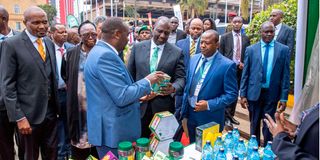Tea farmers want better pay, not political rhetoric

President William Ruto flagging off value-added tea to Accra, Ghana during the AFCFTA Guided Trade Initiative at KICC, Nairobi County.
At the height of the agitation for tea reforms by farmers, the central theme was clear: “We want more money for our sweat.” Buffeted by Covid-19 and its aftershocks, rising inflation and erratic production, tea income became a key concern and the growing sentiment was that of discontent with how the sector was being run.
Auction prices declined over the years to below the production costs. By mid-last year, the prices had declined to $1.9 (Sh231) for a kilogramme of made tea with considerable economic pressure on farmers: Missed loan repayments, struggle for household essentials and school dropouts, among others.
The then-leadership of Kenya Tea Development Agency (KTDA) fought the reforms using farmers’ money on expensive litigation. The board members, some of whom had served for more than 20 years.
Value addition
The government’s focus to increase earnings for tea farmers was buttressed by President William Ruto’s flagging off of a Ketepa tea consignment to Ghana under AfCFTA. He said value addition and diversification to products like orthodox teas would give tea farmers more money. Intra-Africa trading will also push sales and value for Kenyan tea.
And while flagging off 88,000 tonnes of subsidised fertiliser for smallholder tea farmers recently, Deputy President Rigathi Gachagua pledged the government’s willingness to improve tea farmers’ welfare.
Saying that can only be achieved by working with KTDA as an aggregator, the DP wondered why the old directors were interested in regaining control of the agency, saying they should wait for the elections.
The change in the KTDA board and management in July last year steadied the ship via targeted interventions in reforms buttressed by the new Tea Act.
Among these was the introduction of a reserve (basement) price for teas from KTDA-managed factories. Prices have since rallied to over $2.7 per kilo of made tea from a lowly $1.9.
The monthly payment was increased in some regions to Sh20 per kilo of green leaf delivered, up from Sh17. Payment dates also changed to the first week of the following month, from the third. Interest rates for Greenland Fedha loans were cut to eight per cent to increase access to affordable credit and reduce the loan burden.
Through lobbying, KTDA has also managed to secure a fertiliser subsidy from the government over the past two years for its farmers, cutting input costs.
Other initiatives include investment in small hydropower stations for cheaper power supply, diversification to orthodox teas in 11 factories to reduce reliance on Black CTC teas and training of farmers on income diversification and management.
The legal challenges to the new directors have caused considerable angst among the more than 630,000 KTDA farmers, who are optimistic about the new direction with regard to the business, incomes and inputs. The attempted claw-back by former directors is, thus, seen as a rollback on the progress and assault on the economic welfare of farmers.
Stable leadership is the only way to ensure tea farmers improve their earnings and see to innovations and value addition. The old directors should not attempt to disrupt the upcoming AGMs.
Mr Mworia is a communications specialist and tea farmer. @PR_Optimist




